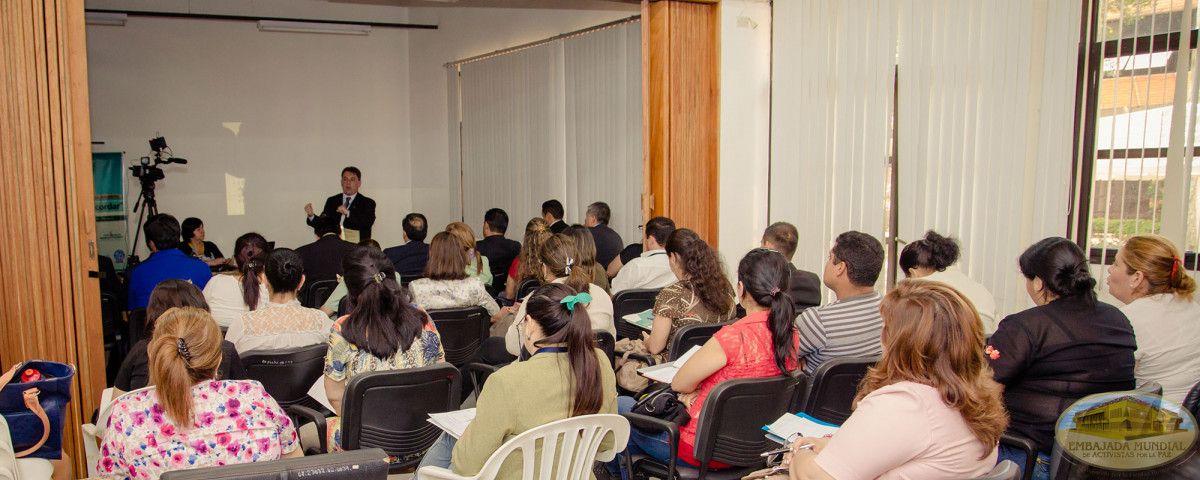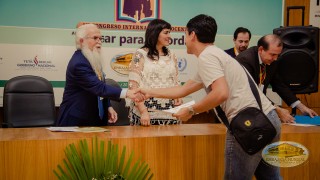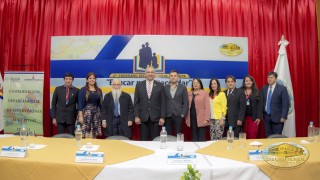Instructional Strategies and Commitments for Teaching about the Holocaust
October 15, Asuncion, Paraguay
The Global Embassy of Activists for Peace continued the second day of the International Educational Congress "Educate to Remember" held in Paraguay, where the main objective of this final day was to raise awareness in participants on a multidisciplinary education on the subject of the Holocaust of World War II.
Mario Sinay PhD in Education, from Israel, specializing in Pedagogy of the Shoah and Visual Pedagogy; the General Director of the National Bureau of Employment of the Ministry of Labor of Paraguay, Dr. David Velasquez; public speaker Rolf Bjarne Fostervold; Dr. Franco Fiumara of Argentina, Dr. Camilo Montoya of Colombia, and Global Ambassador of Peace, Dr. William Soto Santiago, were the lecturers responsible for a successful completion of this Congress in Paraguay.
Dr. Mario Sinay expert on the subject of the Holocaust, showed the different pedagogical tools that are designed for the teaching of this genocide: books, testimonies, films and drawings of children who were victims of this crime. They allow us to historically study and analyze the Holocaust from a universal perspective: "To really make education relevant and attractive it must be taught through a historical process."
In his lecture: "Paraguayan policy toward Jews during the Holocaust in Europe" Dr. David Velasquez explained why research cannot be analyzed from the protagonists of history, from those who resisted, or simply from the concentration camps, but rather from the role played by countries who were not involved, "If there are elements of the past that did not seem important, we must begin to open our eyes, because they may be more critical than we may realize."
One of the most moving speeches was from the public speaker Rolf Bjarne Fostervold, with the topic "Genocide of the Aché Indians in Paraguay", who showed a similarity between World War II and the violation of human rights and abuses of the Aché indigenous community in Paraguay: "The Paraguayan civilization, military and government cooperated with their silence, they did nothing to stop it."
Fostervold recommended listening to the Aché and indigenous communities as a way to create fairer nations and societies. As a testimony to this, he presented Lorenzo Puapiran, son of an Aché enslaved for more than 40 years.
At the end the morning session, they proceeded to a photo exhibition on the Holocaust. The afternoon session began with a lecture by Dr. Marcelo Franco Fiumara, Judge before the Oral Criminal Court of Argentina and professor at the University of La Matanza, who emphasized the task that teachers and professors have to provide a focused education on prevention, given the late arrival of justice.
Dr. Montoya Camilo Reyes, Attorney before the Superior Court of Bogotá, Colombia, and university professor, urged teachers to be more careful with the messages they convey, given their responsibility towards future generations, "Let us watch our language, which cannot be discriminatory. A single word can be a trigger for a genocide tomorrow."
The conference ended with the words of the Global Ambassador of Peace, Dr. William Soto Santiago, who welcomed the commitment of the Legislative Assembly and the Ministry of Education and Culture of Paraguay to push the bill for Holocaust education as a cross-Chair in schools, colleges and universities in the country: "We must teach to respect the identity of each human being, recognize in each other's differences the reflection of one self, of our individuality; love life, be supportive, live in peace."


